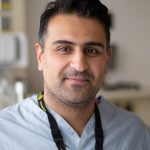Congratulations to UBC Department of Medicine members who have been awarded 2023 Michael Smith Health Research BC Reach Awards and Convening & Collaborating (C2) Program Awards.
MSHRBC Reach Program provides funding for teams of researchers and research users to support the dissemination and effective uptake of research evidence.
MSHRBC’s Convening & Collaborating (C2) Program is designed to build capacity for the development and use of research evidence in practice, policy and further research by promoting knowledge exchange between health researchers and research users.
In 2023, the MSHRBC C2 and Reach Award recipients from the UBC Department of Medicine are:

Dr. Rachel Carter (Division of Palliative Care)
C2 Project: Co-developing research priorities for improving palliative care for patients with advanced disease who also experience structural inequities.
Despite experiencing much higher death rates, people living with structural inequities are not adequately served by the current healthcare system, including by palliative care services. As a key provider of healthcare to people living in Vancouver’s Downtown Eastside (DTES), Providence Healthcare’s (PHC) Division of Palliative Care is establishing a research program for equity-informed palliative care. The knowledge gained by this program will allow PHC to improve access to and quality of palliative care for patients with advanced disease who also experience structural inequities. To allow this research program to be truly patient centred, and ensure the experiences and perspectives of all relevant patient populations are prioritized, we will co-develop the research priorities with:
- people with lived experience of palliative care for people experiencing structural inequities (such as family/friend caregivers),
- people experiencing structural inequities who may need palliative care in the future,
- representatives from community-based organizations serving this population, and
- members of the healthcare system.

Dr. Eman Hassan (Division of Palliative Care):
Reach Project (Principle Investigator): Fostering Grief and Bereavement Literacy in the Workplace for Those Who Serve People Experiencing Homelessness
Our recent research in BC shows that there is lack of grief support services available for people experiencing homelessness after they lose someone they care about. One common source of grief support for people experiencing homelessness are frontline workers. Yet, recent research found that frontline workers are commonly not provided grief support training, and their own work-related grief after a client dies is largely unsupported. In our survey of frontline workers in BC, almost all expressed a desire to increase their knowledge of grief.
Our project aims to improve grief knowledge and support skills for frontline workers who serve people experiencing homelessness. The project includes two steps: 1) Co-creating and testing an online grief education module and resources with a working group of community-based organizations, subject matter experts, and public partners; 2) Launching the developed module and resources through a symposium and exploring with experts in the field ways to make them more accessible for frontline workers. The ultimate goal of the project is to enhance the grief literacy for frontline workers and improve their abilities to provide better grief support to their clients who are experiencing homelessness.

Dr. Agnes Lee (Division of Hematology)
Reach Project (Co-Lead): Celebrating World Thrombosis Day: Raising Awareness to Save Lives
Our bodies need to be able to form blood clots after injuries such as cuts; these clots are essential because they keep us from bleeding to death. However, blood clots can also form in parts of our bodies where they are not supposed to. The formation of these “wrong” blood clots is called thrombosis, and is the cause of many life-threatening conditions, including heart attacks, strokes, and deep vein thrombosis (DVT). Thrombosis is the cause of death for 1 in 4 people worldwide. October 13 is declared as “World Thrombosis Day” – a day dedicated to raising awareness and educating the public about thrombosis, how to prevent it, and how to recognize the signs of a medical emergency. The purpose of this Reach Grant application is to support a “Café Scientifique” – an openly accessible and inclusive information session aimed at the general public. Our team of physicians and blood researchers will host a panel discussion on World Thrombosis Day (October 13, 2023) to inform the public about the prevention and management of heart attacks, strokes and other thrombosis-related conditions. A better public awareness of thrombosis will help to reduce thrombosis-related sickness and disability in our communities, and ultimately save lives.

Dr. Mypinder Sekhon (Division of Critical Care Medicine)
Reach Project: Targeting rural healthcare professionals, trainees and patients in disseminating neuroscience-based research
Ischemic brain injury refers to brain injuries that occur from a lack of blood flow and oxygen delivery to the brain. Current clinical management strategies and therapeutics have shown little effect on patient outcomes. As such, urgent research is ongoing with promising breakthroughs in this field by a multidisciplinary group of researchers in British Columbia. Given the urgency of disseminating research findings, this project will involve knowledge translation activities that target three main groups of knowledge users: a) healthcare providers in rural and remote settings in BC; b) healthcare professional trainees; and c) patients, caregivers and the general public. By undertaking targeted knowledge translation activities to each of these groups, the implementation of research findings will be equitable (for all British Columbians including those from rural settings), long-lasting (healthcare professional trainees will be equipped up-to-date knowledge) and patient-centered (disseminating the findings directly to patients and the public).

Dr. Kate Shannon (Division of Social Medicine)
Reach Project: CGSHE’s Gender & Sex in Methods and Measurement: An Educational Symposium focused on Building Equity in Research
This award will support a 1-day educational symposium to be held in Vancouver, BC in summer 2024. The symposium’s aim is to expand attendees’ knowledge of and capacity to ensure accuracy, precision, and inclusion when it comes to gender, sex, and sexuality in health research. Funded by CIHR Sex and Gender Science Chair to help advance the centre’s strategic priority to increase inclusivity in research, CGSHE Research Equity Toolkit on Gender & Sex in Methods and Measurement (GSMM) was launched in 2022. Attendees will learn about the toolkit and participate in workshops focused on different facets of research design, data collection, analysis, and dissemination, organized around each GSMM tool. Attendees will be able to meet with toolkit co-authors/advisory members, who are 2S/LGBTQ research and methods experts, to get advice on their specific project and data needs. The symposium will culminate in a roundtable focused on identifying a gap in the toolkit. A final tool will be developed following the event, based on the input and insights shared by attendees. The symposium will welcome academic and clinical researchers, healthcare providers, government employees, and others who collect, manage and/or use health data in their work.
To read the full Michael Smith Health Research BC Announcement, please click here